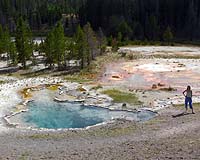 |
London, UK (SPX) Dec 09, 2009 Scientists have ruled out the possibility that methane is delivered to Mars by meteorites, raising fresh hopes that the gas might be generated by life on the red planet, in research published in Earth and Planetary Science Letters. Methane has a short lifetime of just a few hundred years on Mars because it is constantly being depleted by a chemical reaction in the planet's atmosphere, caused by sunlight. Scientists analysing data from telescopic observations and unmanned space missions have discovered that methane on Mars is being constantly replenished by an unknown source and they are keen to uncover how the levels of methane are being topped up. Researchers had thought that meteorites might be responsible for Martian methane levels because when the rocks enter the planet's atmosphere they are subjected to intense heat, causing a chemical reaction that releases methane and other gases into the atmosphere. However, the new study, by researchers from Imperial College London, shows that the volumes of methane that could be released by the meteorites entering Mars's atmosphere are too low to maintain the current atmospheric levels of methane. Previous studies have also ruled out the possibility that the methane is delivered through volcanic activity. This leaves only two plausible theories to explain the gas's presence, according to the researchers behind the findings. Either there are microorganisms living in the Martian soil that are producing methane gas as a by-product of their metabolic processes, or methane is being produced as a by-product of reactions between volcanic rock and water. Co-author of the study, Dr Richard Court, Department of Earth Science and Engineering at Imperial College London, says: "Our experiments are helping to solve the mystery of methane on Mars. Meteorites vaporising in the atmosphere are a proposed methane source but when we recreate their fiery entry in the laboratory we get only small amounts of the gas. For Mars, meteorites fail the methane test." The team say their study will help NASA and ESA scientists who are planning a joint mission to the red planet in 2018 to search for the source of methane. The researchers say now that they have discovered that meteorites are not a source of Methane on Mars, ESA and NASA scientists can focus their attention on the two last remaining options. Co-author, Professor Mark Sephton, Department of Earth Science and Engineering at Imperial College London, adds: "This work is a big step forward. As Sherlock Holmes said, eliminate all other factors and the one that remains must be the truth. The list of possible sources of methane gas is getting smaller and excitingly, extraterrestrial life still remains an option. Ultimately the final test may have to be on Mars." The team used a technique called Quantitive Pyrolysis-Fourier Transform Infrared Spectroscopy to reproduce the same searing conditions experienced by meteorites as they enter the Martian atmosphere. The team heated the meteorite fragments to 1000 degrees Celsius and measured the gases that were released using an infrared beam. When quantities of gas released by the laboratory experiments were combined with published calculations of meteorite in-fall rates on Mars, the scientists calculated that only 10 kilograms of meteorite methane was produced each year, far below the 100 to 300 tonnes required to replenish methane levels in the Martian atmosphere. This research was funded by a grant from the Science Technology Facilities Council. Share This Article With Planet Earth
Related Links Imperial College London Mars News and Information at MarsDaily.com Lunar Dreams and more
 Seeking Life's Shadow
Seeking Life's ShadowMoffett Field CA (SPX) Oct 02, 2009 They haven't yet figured out how to draw blood from stones, but a group of French researchers is offering new insight that could change how scientists search for signs of life in Martian rocks. By studying the laboratory fossilization of microorganisms, scientists have caught a glimpse into how early Earth and potential Martian life might be preserved in rocks. The scientists focused on ... read more |
|
| The content herein, unless otherwise known to be public domain, are Copyright 1995-2009 - SpaceDaily. AFP and UPI Wire Stories are copyright Agence France-Presse and United Press International. ESA Portal Reports are copyright European Space Agency. All NASA sourced material is public domain. Additional copyrights may apply in whole or part to other bona fide parties. Advertising does not imply endorsement,agreement or approval of any opinions, statements or information provided by SpaceDaily on any Web page published or hosted by SpaceDaily. Privacy Statement |